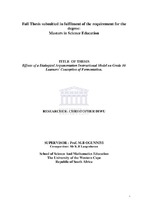Effects of a Dialogical Argumentation Instructional Model on Grade 10 Learners' Conception of Fermentation
Abstract
The study catered for empirical and metaphysical dimensions of science and IKS. The study employed a quasi-experimental design as well as a qualitative research design. Two cohorts of students from a fictitiously named Culture Secondary School have been used in this study. The list of instruments for data collection were as follows: Conceptions of Fermentation (COF) questionnaire which was used to elicit learnerss pre- and post-test conceptions of fermentation with special reference to traditional beer or Umqombothi an Attitudes to Science (ATS) questionnaire which was used to find out the learners' worldviews, a Science Achievement Test (SAT) which was used to assess the learners' generalised knowledge of fermentation, a classroom observation schedule as well as a focus group interview schedule to gather additional qualitative data. All the instruments were in English with all technical and difficult terms in both English and isiXhosa (the learners’ home language). Both groups were exposed to Science/IKS-based lessons. The only difference between the two groups was that, the experimental group (E group) was exposed to a Dialogical Argumentation Teaching Model (DAIM) and the comparison group (C group) to a traditional teaching approach. The data gathered were both analyzed in terms of qualitative and quantitative descriptions.

